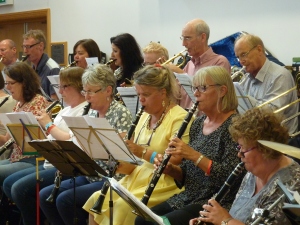
Ludwig van Beethoven as imagined by Wesley Merritt
If you’re singing in the Nottingham Festival Chorus February 2016 concert, you have hopefully now received your brown envelope containing a score of Beethoven’s Missa Solemnis, 2 rehearsal CDs and useful information.
To borrow enough copies, we have had to use three different editions. If you have been sent a Breitkopf or Novello score, there will be two green sheets in your envelope. If you were lucky enough to receive a Peters score, you won’t need the green sheets.
Marking up the Score
HD: The brown envelope is now in our excited hands. What is the first thing we singers should do having opened it?
Angela Kay: Well. The first thing to do is to rub out ALL the pencil markings that have been put in by previous singers. I’d like everyone to do this because as a conductor, it’s pretty annoying when people say, ‘Well in my copy it says this’ or ‘Last time we sang it we did that.’ Those markings were from another choir, another conductor or me at a different time, which isn’t to say that they weren’t right, but because February’s will be a fresh performance. Music is a living organic thing, and research has changed interpretation, so I might well do things differently.
HD: What next?
AK: For those of you without a Peters score, please, please, please, and I appreciate it’s a bit tedious, use the green sheet and write the Peters letters into your Novello or Breitkopf score. You won’t be able to follow the CD or the rehearsals without doing this.
Then look through the score and mark both your own line to sing…
HD: I tend to use a tick.
AK: … and something to ensure you don’t come in by mistake when it should be a soloist singing.
HD: Mine has crosses in it for that very reason. It would be SO embarrassing.
AK: Yes, anything, as long as you know where you need to be on the page, especially as some of it is fast and tricky. Please do it all in pencil as opposed to highlighter pen, which we have actually had. We can’t return those copies to the library and have to buy new ones to replace them.
THE CDs
HD: What’s on the CDs
AK: There is (with a modest twinkle in her eye) myself, giving words of wisdom. I go through each movement in more detail than I have done in the past, line by line. I’ve played some of the more difficult bits on the piano and just generally tried to be enthusiastic, because I am, and I hope the singers will be, too.
Introductions and solo bits have been cut out. I’ve actually put the difficult bits on at a slower speed but at the right pitch, especially the fugues, so that you can sing along. During the course we’ll have time to look at these tricky bits, and we’re going to have additional sectionals during the rehearsal weekend to help with them.
HD: I do have a piano, but I’ve been trying out some piano apps on my iPad. I can pick out the tunes from the comfort of the sofa.
AK: (Laughs) And there are rehearsal tracks available online, like at Choralia.
[We played around with a few of these and decided that, as long as you sing along with the score, the version for ‘voice, with metronome and organ’ is the best one to use. Click here to go to that page.]
HD: And there’s Choraline if folks would like to buy a CD of their part, or download them as mp3 files.
AK: Yes, lots of ways to get a good feel for the piece before the sectional rehearsals in January.
To be continued…
 Angela Kay, Gill Henshaw and Chris McDouall conducted different groupings of instruments. An informal concert, performed to an appreciative audience, concluded the day.
Angela Kay, Gill Henshaw and Chris McDouall conducted different groupings of instruments. An informal concert, performed to an appreciative audience, concluded the day.







 Solemnis is rarely performed due to its challenges. Come and be part of a fantastic opportunity and (what we are sure will be) an amazing concert. Invite your choral friends who live elsewhere, sing in other choirs etc to join you in
Solemnis is rarely performed due to its challenges. Come and be part of a fantastic opportunity and (what we are sure will be) an amazing concert. Invite your choral friends who live elsewhere, sing in other choirs etc to join you in 



